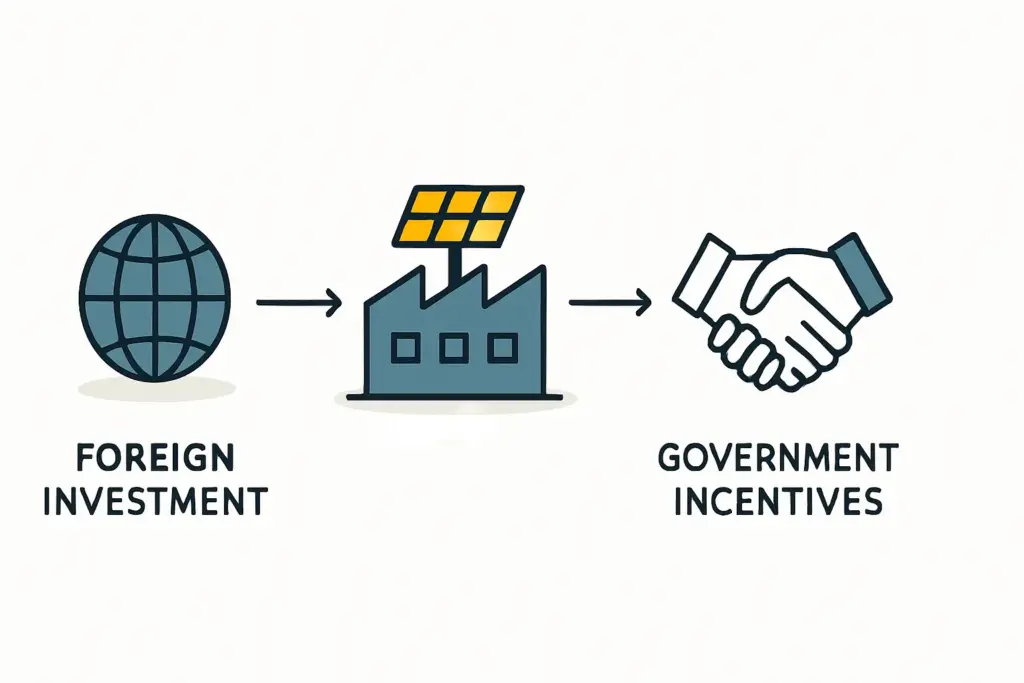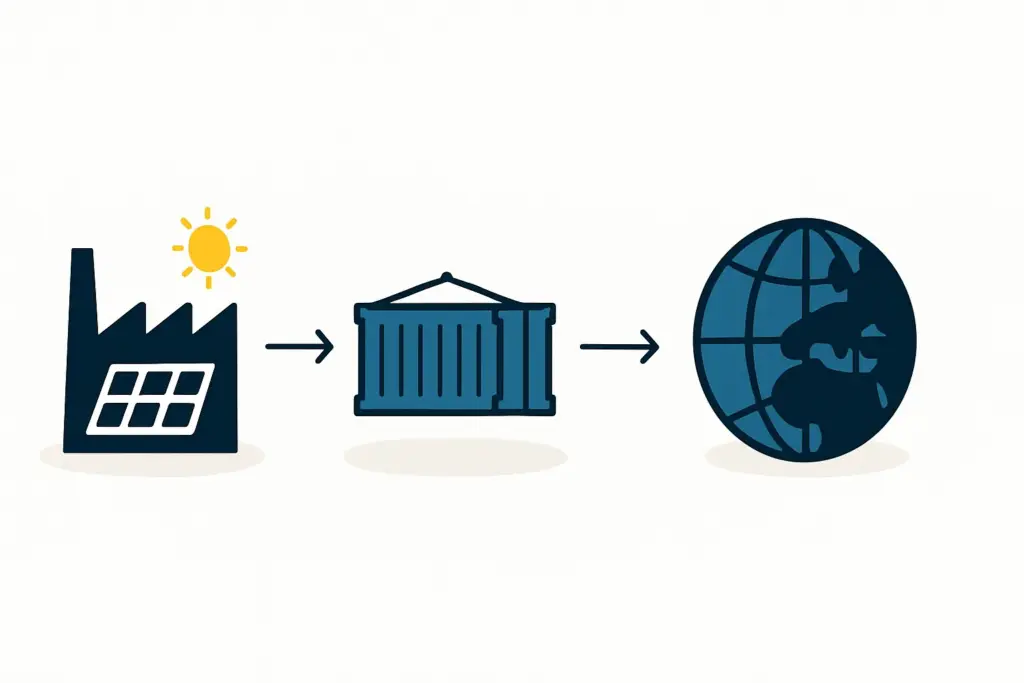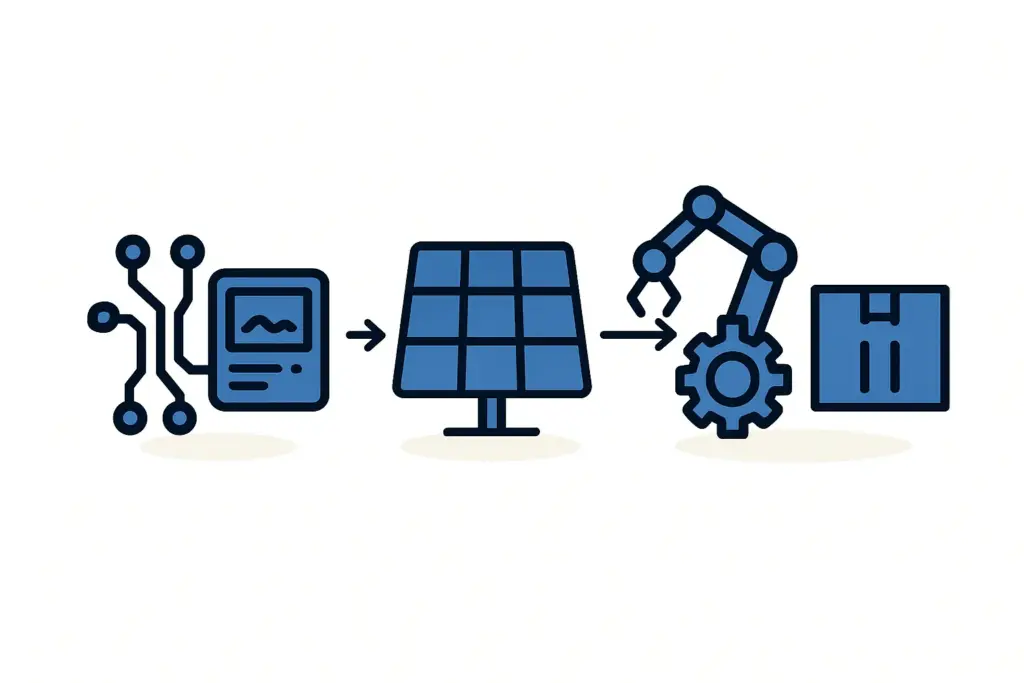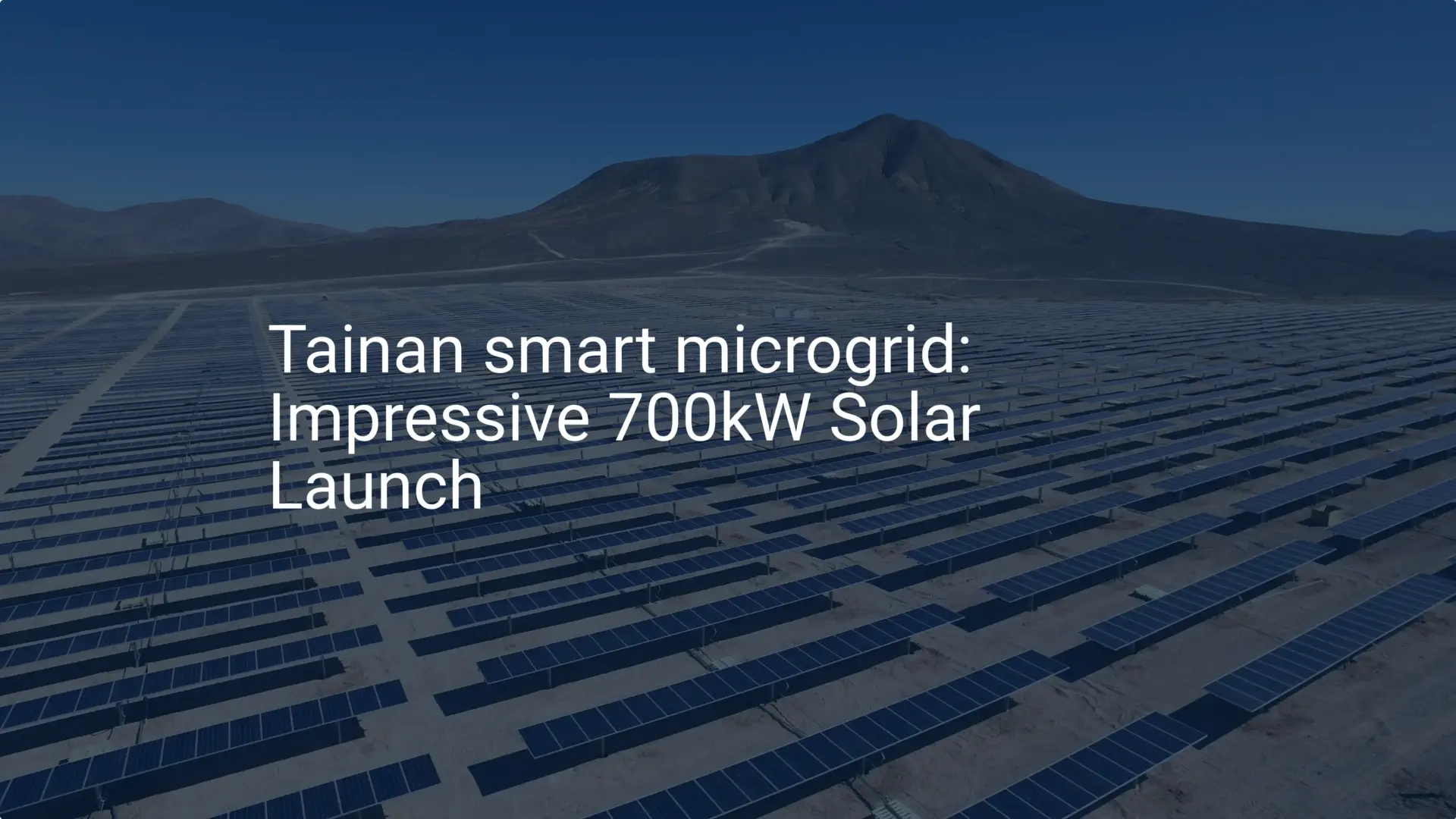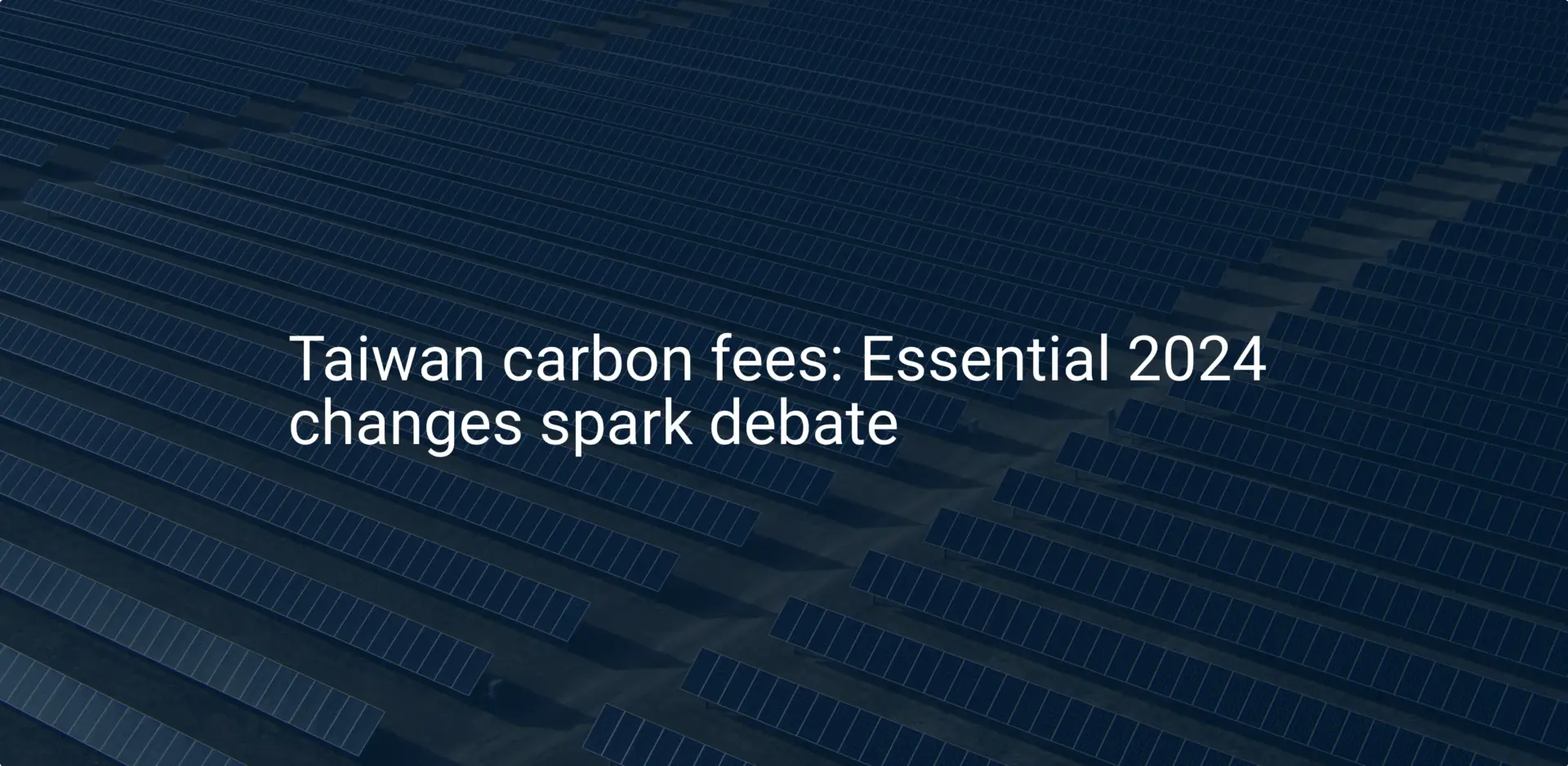Discover comprehensive insights into the statistics, market trends, and growth potential surrounding the solar panel manufacturing industry in Taiwan
- Climate.top – Taiwan. Sunshine & Daylight Hours in Taipei, Taiwan Sunlight, Cloud & Day length. (n.d.). https://www.climate.top/taiwan/sunlight/
- Kung, S. S., Li, H., & Kung, C. C. (2024). Prospects of Taiwan’s solar energy development and policy formulation. Heliyon, 10(1). Retrieved from https://linkinghub.elsevier.com/retrieve/pii/S240584402311019X
- Global Solar Atlas- Taiwan (2024). Retrieved from https://globalsolaratlas.info/map?c=23.6978,120.9605,11&s=23.6978,120.9605&m=site
- Global Taiwan Institute: Taiwan’s Electrical Grid and the Need for Greater System Resilience. Retrieved from https://globaltaiwan.org/2023/06/taiwans-electrical-grid-and-the-need-for-greater-system-resilience/
- Tai Power: Supply Reliability Index. Retrieved from https://service.taipower.com.tw/smartgrid/smart-grid/supply-reliability/supply-reliability-index/
- Global Data : Taiwan Solar PV Market Analysis. Retrieved from https://www.globaldata.com/store/report/taiwan-solar-pv-market-analysis/
- Wikipedia. Electricity Cost in Taiwan. Retrieved from https://en.wikipedia.org/wiki/Electricity_sector_in_Taiwan#:~:text=Power%20generation,-Total%20power%20generation&text=In%20terms%20of%20the%20price,cent%2FkWh%20for%20natural%20gas.
- Solar Quarter (2024): Taiwan’s Ministry of economic affairs. Retrieved from https://solarquarter.com/2024/05/15/taiwans-ministry-of-economic-affairs-announces-2024-renewable-energy-feed-in-tariffs-fit-review-results/#google_vignette
- Statista (2023). Distribution of electricity generation in Taiwan by source. Retrieved from https://www.statista.com/statistics/1237635/taiwan-distribution-of-electricity-production-by-source/
- Melo, F. C., da Graça, G. C., & Panão, M. J. O. (2023). A review of annual, monthly, and hourly electricity use in buildings. Energy and Buildings, 293, 113201. Retrieved from https://www.sciencedirect.com/science/article/pii/S0378778823004310
- Shen, Y. H., & Chang, H. S. (2024, April). Assessment of Residential Electricity Consumption and Renewable Energy Self-Sufficiency–a Case Study of Tainan, Taiwan. In KEEP ON PLANNING FOR THE REAL WORLD. Climate Change calls for Nature-based Solutions and Smart Technologies. Proceedings of REAL CORP 2024, 29th International Conference on Urban Development, Regional Planning and Information Society (pp. 47-57). CORP–Competence Center of Urban and Regional Planning. Retrieved from https://www.corp.at/archive/CORP2024_101.pdf
- Tai Power: Renewable Energy Overview. Retrieved from https://www.taipower.com.tw/en/page.aspx?mid=4495
- PV Tech : 20GW by 2025: Behind Taiwan’s big solar numbers. Retrieved from https://www.pv-tech.org/20gw-by-2025-behind-taiwans-big-solar-numbers/
- Technavio (2023): Off-grid Solar Power Systems Market Analysis APAC, Europe, Middle East Africa, North America, South America – China, Kenya, India, US, Indonesia – Size and Forecast 2024-2028. Retrieved from https://www.technavio.com/report/off-grid-solar-power-systems-market-industry-analysis
- PWC (2024) : 2023 Taiwan CPPA market. Retrieved from https://www.pwc.tw/en/publications/taiwan-re-market-updates/taiwan-cppa-market-report.html
- Statisa (2024): Solar Energy – Taiwan | Statista Market Forecast. Retrieved from https://www.statista.com/outlook/io/energy/renewable-energy/solar-energy/taiwan
- Salary Explorer (2024). Solar Thermal Technician Average Salary in Taiwan 2024. Retrieved from https://www.salaryexplorer.com/average-salary-wage-comparison-taiwan-solar-thermal-technician-c212j12680
- Salary Explorer (2024). Sales Representative Average Salary in Taiwan 2024. Retrieved from https://www.salaryexplorer.com/average-salary-wage-comparison-taiwan-sales-representative-c212j675
- Glassdoor : Sales Manager Salaries in Taiwan. Retrieved from https://www.glassdoor.com/Salaries/taiwan-sales-manager-salary-SRCH_IL.0,6_IN240_KO7,20.htm
- Salary Explorer (2024). Solar Energy Systems Engineer. Retrieved from https://www.salaryexplorer.com/average-salary-wage-comparison-taiwan-solar-energy-systems-engineer-c212j12678
- Wage Indicator (2024). Minimum Wage in Taiwan. Retrieved from https://wageindicator.org/salary/minimum-wage/minimum-wages-news/2024/minimum-wage-increased-in-taiwan-from-01-january-2024-january-01-2024
- Worldometer (2024): Population Of Taiwan. Retrieved from https://www.worldometers.info/world-population/taiwan-population/
- Focus Taiwan (2024) – cost of living/Taiwan to raise residential and industrial electricity rates. Retrieved from https://focustaiwan.tw/business/202403220017
- Focus Taiwan (2024). Taiwan state-owned utility evaluates water price adjustments. Retrieved from https://focustaiwan.tw/society/202401260017#:~:text=As%20of%20Aug.,is%20issued%20monthly%20or%20bimonthly.
- Global Taiwan Institute. (2023, June 14). Taiwan’s electrical grid and the need for greater system resilience. Retrieved from https://globaltaiwan.org/2023/06/taiwans-electrical-grid-and-the-need-for-greater-system-resilience/
- Renewable Energy Development Act – Article content – Laws & Regulations Database of the Republic of China (Taiwan). (n.d.). Retrieved from https://law.moj.gov.tw/ENG/LawClass/LawAll.aspx?pcode=J0130032
- Taiwan PV Taiwan PV Industry Association. (n.d.). Global Solar Council. https://www.globalsolarcouncil.org/members/taiwan-pv-industry-association/
- Energy Taiwan & Net-Zero Taiwan. (n.d.). Retrieved from https://www.energytaiwan.com.tw/en/index.html
- Promoting green energy innovation. Retrieved from https://english.ey.gov.tw/News3/9E5540D592A5FECD/16bd3a41-9c6a-485c-9498-b6b2b8240f6e
- Power Technology. Solar PV capacity in Taiwan and major projects. Retrieved from https://www.power-technology.com/data-insights/solar-pv-in-taiwan/?cf-view&cf-closed
- Top 8 largest Taiwanese Companies in the Solar industry by Market Cap . Retrieved from https://disfold.com/taiwan/industry/solar/companies/
- Council, N. D. (2015). National Development Council. Retrieved from https://www.ndc.gov.tw/en/Content_List.aspx?n=BCDB1EECF95E18E2
- Lickova, V. (2023, July 20). Taiwan’s Energy (In) security: Between Green Ambitions vs. Fossil Fuel Realities. The Diplomat. https://thediplomat.com/2023/07/taiwans-energy-insecurity-between-green-ambitions-vs-fossil-fuel-realities/
- Energy Taiwan & Net-Zero Taiwan-Net-Zero Taiwan. (n.d.). https://www.energytaiwan.com.tw/en/menu/BCDF1AFB4627A890D0636733C6861689/info.html





